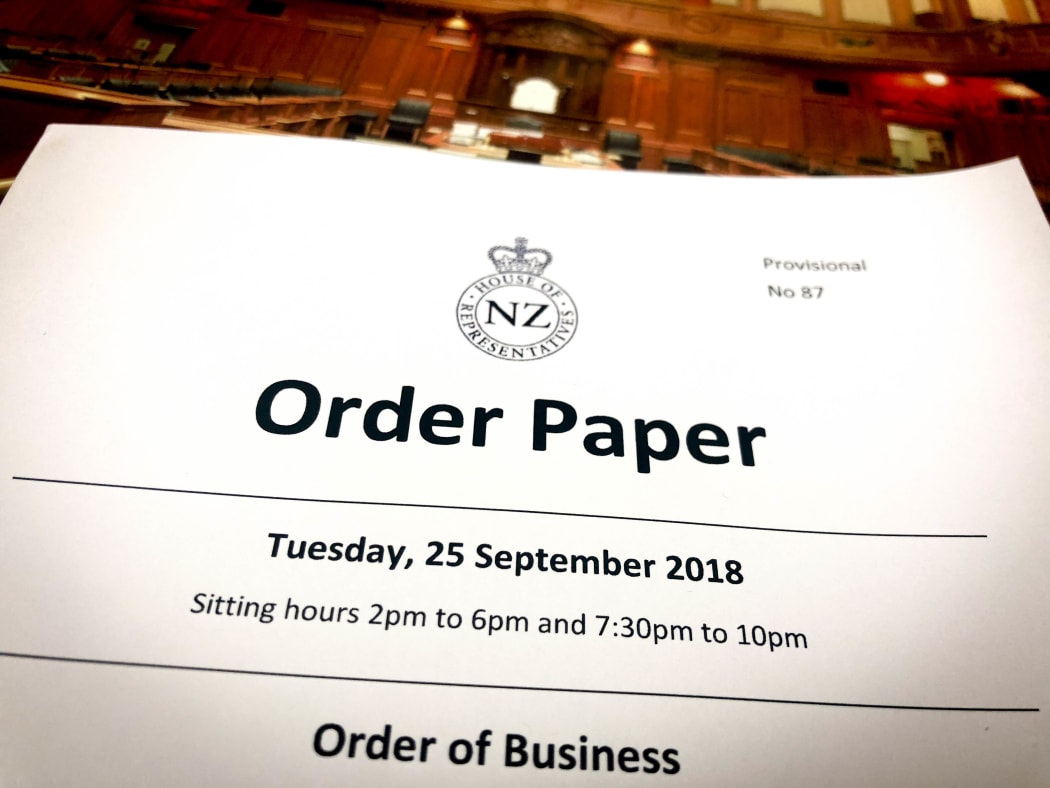Prepare for more long Tuesdays this week as the House plans to sit Wednesday morning.
Usually the House sits from 2pm on sitting days (Tues, Weds, Thurs on sitting weeks which are scheduled here) but if the Government feels they need more time to get things done it can extend one of the sitting days into the following morning.
They’re not kidding about the “extend” part either; the calendar marking Tuesday in the House won’t be flipped over till 2pm on Wednesday meaning while the rest of the country starts Wednesday-humpday in the morning as usual, the House will still be stuck on Tuesday.
More on extended hours here.
The legislation they’ll work through while they’re messing with calendars is decided by the Leader of the House and this week the Acting Leader of the House Iain Lees-Galloway is stepping in.
An outline for this week (25 - 27 September) is below.

Photo: VNP / Daniela Maoate-Cox
MPs are required to be at Parliament for scheduled sitting days, so called because MPs sit in those green leather chairs when they’re in the debating chamber. An agenda known as the Order Paper is published online each sitting day outlining what business the House plans to get through. But things change and time is limited so below is what they’ll try their best to do.
Ghosting your party
What:
-
The committee stage and if there’s time the third reading of the Electoral (Integrity) Amendment Bill. The committee stage is used by the House to debate the details of the bill including any proposed amendments. It's set down for third reading on Thursday.
-
Commonly referred to as the “waka jumping” bill the Electoral (Integrity) Amendment Bill is about MPs leaving a Party. The Bill will change the Electoral Act 2003 to say that any MP who resigns from a party should also lose their seat in Parliament. They would have to either seek re-election from their electorate or make way for the next person on the list. To kick out an MP the Party leader would need to have the support of most of their own caucus (two thirds) and show that the MP is distorting the proportionality of Parliament. More on the Bill here.
-
There have been heated debates over this bill with National saying it would "hurt New Zealand's reputation" and the Green Party promising to support it despite the Party's historic opposition to it.
Drug trafficking on the seas
What:
-
The third reading of the Maritime Powers Extension Bill
-
The Bill will give greater powers to New Zealand Customs to stop trafficking of illegal substances and clarify where NZ customs has the power to do so.
-
Customs would be able to stop, board, and search a ship both in New Zealand waters or on the high seas, even if the ship is flying a foreign flag (so long as that country is a party to the UN Conventions). NZ could also charge those involved in smuggling to or from New Zealand, even on the high seas.
Why:
-
New Zealand has obligations under United Nations Conventions including the Law of the Sea and Drug Trafficking
No school till you’re five
What:
-
The continued first reading of the Education Amendment Bill (No 2).
-
This follow up Bill of adjustments for education makes a number of changes including: adding student safety to the requirements for registration of private schools; preventing the Education Council from unilaterally changing the qualification requirements for teachers; expanding the provision of distance education through communities of online learning; ensuring that the option of ‘cohort entry’ (beginning in groups, not one by one on their birthday) for new-entrants doesn’t mean children start school before they are 5 years old.
Why:
-
The cohort change will mean that schools will now be able to opt for start-of-term or mid-term cohort entry (of all new students who turned five since the last cohort). This is because some children were starting school up to two months before they turned five (to be in the cohort closest to their birthday).
Getting paid the same
What:
-
The first reading of the Equal Pay Amendment Bill.
-
The Bill will describe what a pay equity claim is and introduce a new process for working through them.
-
To make a pay equity claim the employee needs to establish that their work is predominantly done by females and that it is currently undervalued.
-
If it’s agreed that a pay equity claim exists then the parties can use mediation tools in the Employment Relations Act toolkit to negotiate. The Bill allows for backpay to be agreed or ordered.
Why:
-
The Bill is aimed at eliminating pay discrimination based on sex, for work that’s mostly done by women, compared with similar occupations with male dominance.
-
Pay equity claims are settled through negotiation or by the courts but this bill provides a process for parties to bargain with each other directly.
The fibre aftermath
What:
-
The committee stage of the Telecommunications (New Regulatory Framework) Amendment Bill. The bill was brought to Parliament under the previous government and picked up by the current one.
-
Introduces a new outline for the regulation of fibre fixed-line services from 2020, while retaining copper fixed-line regulations where no fibre alternatives are available.
-
It also extends consumer safeguards, streamlines response to competition problems, especially in the cellular market, and provides more oversight of retail service quality.
Why:
-
The Bill describes itself as regulatory changes “needed in view of the major growth in fibre network services and the relative decline in copper fixed line services.”
Taupatupatu Whānui - General Debate (every Wednesday after Question Time at about 3pm).
What:
-
Twelve speeches of up to five minutes in length after question time on Wednesdays in the House. Speeches are divvied up proportionally so bigger parties get more speeches. Because Ministers aren’t counted in the proportional divvy-up, the opposition side of the House gets more speeches than the government side.
Why:
-
The general debate is a chance for MPs to bring up issues that would otherwise not come up before the House, making it a wide-ranging debate. Sometimes parties take a coordinated approach and speak on the same issue but there’s no rule that they have to.
Please sir, don’t give me any more.
What:
-
All stages of the Remuneration Authority (Members of Parliament Remuneration) Amendment Bill which has the solitary goal of preventing MPs from getting a pay rise this year.
-
The intention is to push it through all stages this week to get it signed off before the pay rise would otherwise occur.
Why:
-
The pay and allowances that MPs receive are not decided by MPs. They are set by the Remuneration Authority and based on a formula that takes into account pay levels across the public sector. This is all set down in law to take it out of MPs' hands, so they don’t set their own pay.
-
The Remuneration authority has announced that MPs remuneration would increase this year by nearly 3%. MPs decided this was a bad look and the Prime Minister announced they would pass a law to stop the rise. This is that law.
You can see how much the House gets done each sitting day by going here: Daily progress in the House



